Did you know that one overlooked healthcare degree is rapidly becoming the most sought-after qualification in the industry? It’s reshaping how we approach healthcare, and it might just be the key to your career transformation.
With the healthcare sector evolving faster than ever, understanding these shifts is crucial. New roles are emerging, demanding innovative skills, and nursing degrees are stepping into the spotlight. Why is this happening now? The reasons might surprise you.
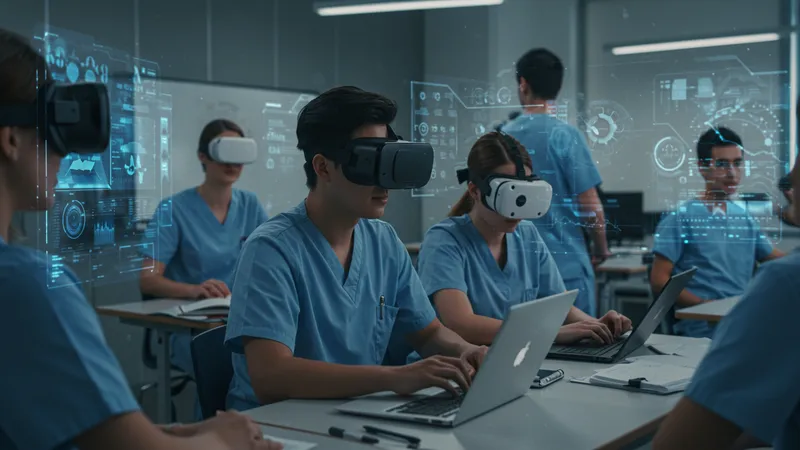
The most surprising part of the nursing revolution is who’s getting involved. Unlike before, more people outside the traditional healthcare background are enrolling in nursing degrees, drawn by flexible certification pathways and lucrative job prospects. In fact, many students are drawn to the promise of faster entry into a stable career. But that’s not even the wildest part…
Perhaps even more intriguing is the way these programs are integrating cutting-edge technology into their curriculum. New virtual reality simulations and AI-assisted learning tools are being piloted, making training both accessible and cutting-edge. Imagine learning bedside care without stepping into a hospital. Now consider the expert objections and debates this has sparked. But these innovations are just the tip of the iceberg.
What happens next shocked even the experts in the field. There’s a surprising twist that has sent ripples through the healthcare community, potentially reshaping the way we think about degrees. As we dive into the next pages, prepare yourself for revelations that could redefine your career path as a future healthcare provider…
The digital revolution has ushered in an era where obtaining a nursing degree online is not only possible but increasingly popular. With rigorous accreditation and evolving technologies, these programs rival traditional paths. Candidates are enticed by the flexibility—they can study at their own pace, balancing other responsibilities like work or family obligations. But are online degrees truly on par with in-person training? This question is more complex than it seems.
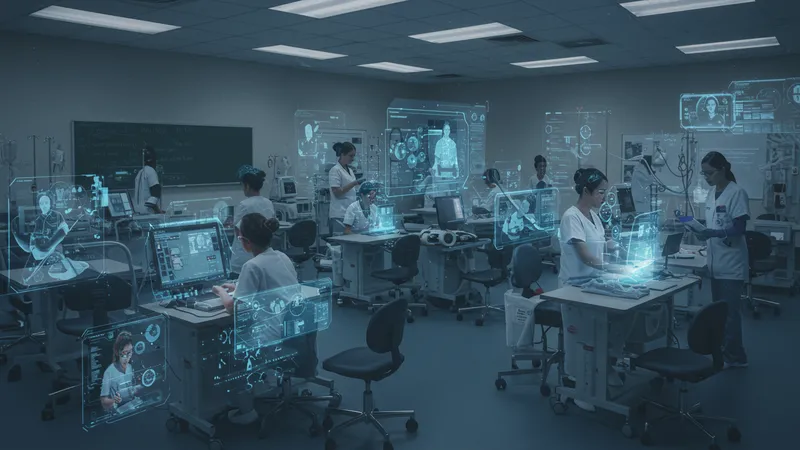
The secret lies in the technology used. Advanced simulation software provides students with near-real experiences of hospital scenarios. These tools, some with AI integration, offer real-time feedback and adjustment, optimizing the learning process—not to mention reducing the anxiety of stepping into a real hospital for the first time. Some say these tools might even surpass traditional learning by providing immersive, controlled environments. But there’s one more twist…
Despite the enthusiasm, there’s a potent debate about the emotional readiness of nurses trained online. Critics argue that without face-to-face interactions, online-trained nurses might miss out on crucial bedside mannerisms. Yet, some studies suggest otherwise, showing comparable, if not superior, empathy levels in online graduates due to more focused interpersonal communication training. What does this mean for patients and healthcare efficiency?
What you read next might change how you see this forever. As the debate rages, hospitals and clinics are beginning to view online-trained nurses as assets rather than liabilities. A fundamental shift is occurring—focusing on skills and knowledge over the method of acquisition. As we move forward, this paradigm shift could redefine what it means to be a qualified nurse. But hold on, the revelations keep coming…
Virtual reality (VR) and augmented reality (AR) are no longer just for gaming or entertainment. They have become pivotal in nursing education, transforming how students learn crucial skills. These technologies enable students to practice complex procedures in a risk-free environment, providing more than traditional mannequin-based simulations ever could. The limitless scenarios they offer could be the future standard for nursing education. So, what’s the catch?
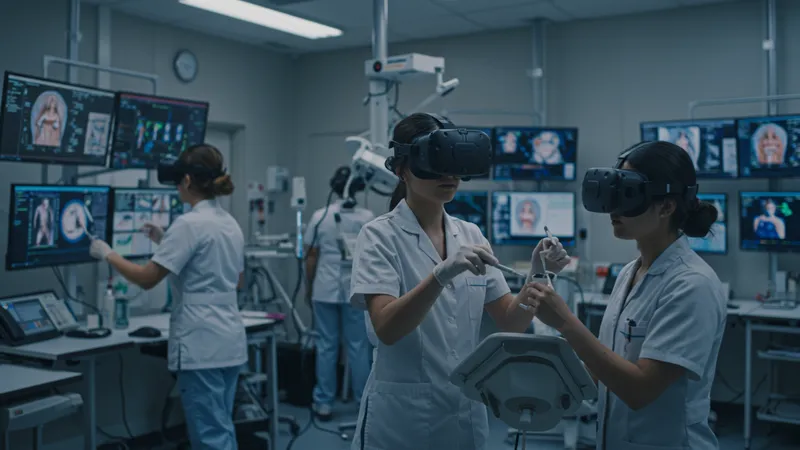
Despite their benefits, implementing VR and AR in nursing programs is not without challenges. The costs associated with these technologies can be prohibitive, limiting wider implementation. Moreover, there’s the hurdle of techno-literacy—ensuring both instructors and students are adept at using these tools effectively. Can the nursing field adapt rapidly enough to integrate this cutting-edge technology? The answers might surprise you.
While skepticism persists, the early adopters have reported staggering improvements in student outcomes. According to some institutions, VR-trained students exhibit faster cognitive recognition skills and greater procedural confidence. These early successes have started to tip the scales in favor of more widespread adoption. But where does this leave traditional tactile learning methods?
It turns out that a hybrid approach is emerging as the new gold standard. Educational pioneers are combining high-tech simulations with hands-on experience, introducing a balanced curriculum that harnesses the strengths of both methods. With this intriguing blend, the future of nursing education looks more promising than ever. But what lies beyond this fusion? Prepare for more astonishing insights…
The financial implications of pursuing a nursing degree are significant, yet they can vary drastically depending on the chosen path. Online programs often offer more affordable tuition and eliminate costs associated with on-campus living. However, the necessity of investing in technology—like a reliable computer and internet, not to mention specific software—introduces different financial considerations.
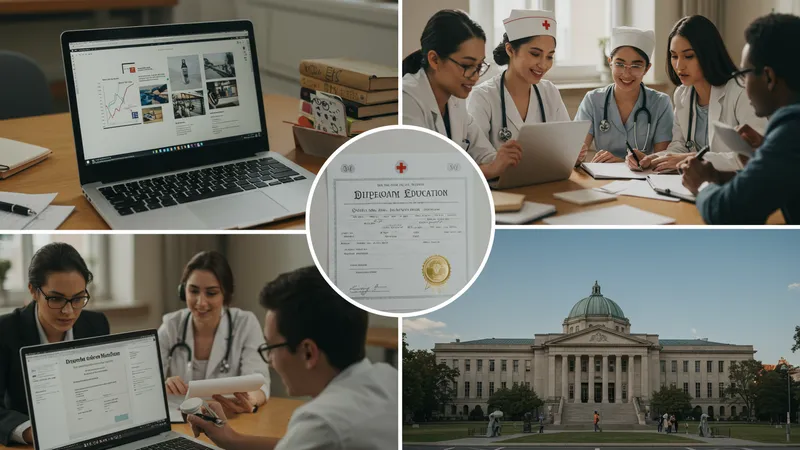
Government initiatives and funding have increasingly supported nursing programs, reflecting the acknowledgment of their societal importance. Scholarships and grants are more accessible than ever, but navigating these opportunities requires awareness and timely action. The notion that nursing degrees are unaffordable is rapidly becoming outdated. But what’s driving these changes?
The undeniable demand for healthcare professionals has propelled governments and institutions to innovate funding models. With aging populations worldwide, the need for qualified nurses is only growing. This creates an economic environment where investing in nurse training programs is not only prudent but necessary for sustainable healthcare systems.
This economic perspective also promises personal financial rewards. Nursing remains one of the most stable, high-earning professions, particularly in an uncertain global economy. As the pages unfold, we’ll explore how these financial dynamics interact with personal career trajectories and what strategies you can adopt to maximize your investments. The surprises keep unfolding—stay with us to discover what awaits in the nursing world.
The landscape of career advancement in nursing is transforming, and networking plays a critical role. Traditionally seen as an individual endeavor, modern networking is about leveraging technology and communities to forge connections that were previously unimaginable. From global online forums to dedicated apps, strategic networking gives aspiring nurses unprecedented access to mentors and peers worldwide.

Platforms like LinkedIn have evolved beyond digital resumes to vibrant ecosystems where professionals can share insights, offer advice, and collaborate on projects. These resources redefine how nurses navigate their careers, providing platforms to display expertise, learn from diverse cultures, and even discover job openings before they’re officially posted.
Yet, despite these advancements, mastering the art of networking requires intentionality and skill. It's about contributing knowledge while seeking to learn, striking a balance that oftentimes eludes newcomers. The accessibility of these networks minimizes the barriers to entry, but distinctions, such as personal branding and etiquette, become paramount in standing out.
Many nurses find that joining professional associations, both online and offline, builds a crucial support system. Understanding these dynamics can elevate your career to new heights, breaking past limitations into previously unreachable opportunities. Intrigued? Let’s uncover more about the transformative power of these connections and where they might lead you next.
While technical skills are vital, emotional intelligence (EI) is increasingly recognized as a cornerstone of effective nursing. This aptitude involves empathy, self-awareness, and the ability to connect deeply with patients and colleagues—skills essential for patient-centered care. Surprisingly, EI can be cultivated like any other skill, opening up a new dimension of professional development for nurses.
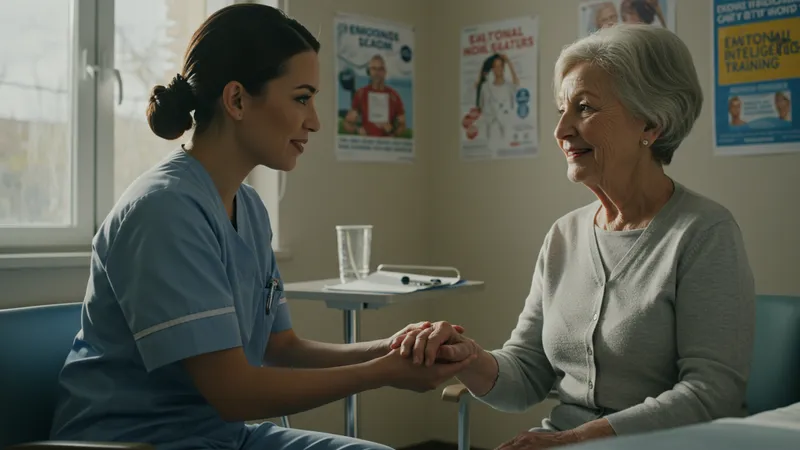
Incorporating emotional intelligence training into nursing curricula is becoming a key focus for educational institutions. Programs emphasize self-reflection, active listening techniques, and managing emotional stress—ensuring nurses not only care for patients but also sustain their well-being in high-pressure environments. These aspects can transform patient experiences and outcomes significantly.
The shift towards appreciating EI leads to changes even within hiring practices. Employers are increasingly valuing candidates who demonstrate strong interpersonal skills alongside clinical expertise. Hospitals and clinics look for team players who can adapt to the ever-changing dynamics of healthcare environments.
The rise of emotional intelligence as a respected attribute in nursing is a game-changer, suggesting a future where the human side of care is as vital as the technical. As we delve deeper, consider how this evolution might influence your nursing journey and the broader industry. Prepare for more revelations that challenge traditional paradigms.
Cultural competence is another evolving area within the nursing field, highlighting the ability to provide meaningful care across different cultural backgrounds. This competence not only improves patient satisfaction but also addresses health disparities prevalent in multicultural societies. Understanding these complexities becomes vital in delivering equitable healthcare.

Educational initiatives aim to expose nursing students to diverse cultures, enriching their perspectives and enhancing their abilities to operate empathetically in varied settings. These programs include cultural immersion projects, language skills, and ongoing cultural sensitivity training, which equip nurses to function effectively in globalized healthcare landscapes.
The advantages of culturally competent nursing extend beyond individual patient care, influencing broader community health outcomes. It drives a more inclusive approach to public health and disease prevention, underscoring the societal role nurses play. This paradigm shift calls for nurses who are adaptable and sensitive to different cultures and beliefs.
The ongoing journey towards cultural competence underscores the dynamic changes transforming nursing education and practice. As we proceed, anticipate uncovering strategies and success stories of culturally adept nurses who have transcended traditional boundaries, offering fresh hope and clarity in our interconnected world.
The vast array of specializations within nursing offers unparalleled opportunities for career advancement. From pediatrics to geriatrics, oncology to neuroscience, the fields available allow nurses to focus on areas they feel passionately about. Specializing can lead to increased job satisfaction, as well as financial and professional rewards.
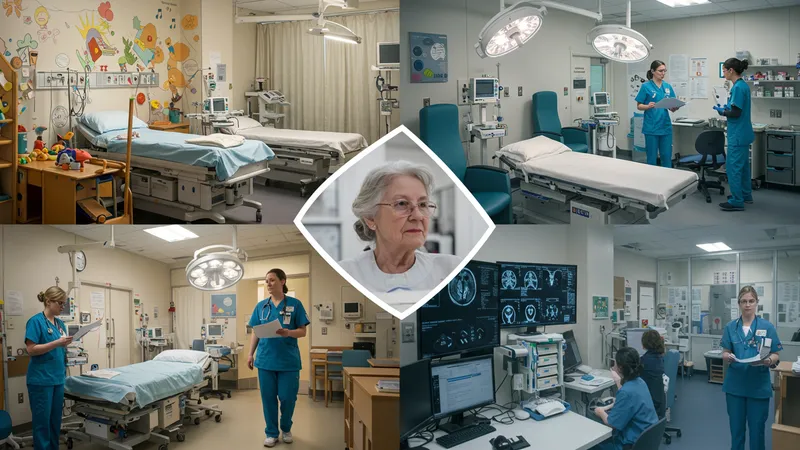
The decision to enter a specialized field requires careful consideration. Factors such as personal interest, demand in the job market, and educational prerequisites play crucial roles in this decision. Hospitals often support nurses in their specialization journey through mentorship programs and financial aid for further education.
Standardized certification processes ensure nurses possess the necessary expertise and skills in their chosen specialization. These certifications are highly valued, signifying a nurse's commitment and advanced knowledge. Institutions and patients alike benefit from their specialized care and insight.
Venturing into specialized fields is not devoid of challenges; balancing additional education with existing responsibilities tests resilience and dedication. However, the rewards are boundless, making specialization an attractive pathway for ambitious nurses seeking to elevate their impact. The following pages will navigate deeper into the intricacies of choosing the right specialization and the unforeseen benefits awaiting those who pursue them.
The dream of working internationally is within reach for many nurses, offering a rare blend of personal growth and professional development. Nursing in different countries opens up diverse experiences, exposing practitioners to various healthcare systems and protocols. The aspiration to travel and work globally is becoming increasingly feasible, thanks to international exchanges and partnerships.

Despite this allure, international nursing presents unique challenges. Licensing requirements vary widely, demanding adaptability and perseverance. Navigating language barriers and cultural differences necessitates strong interpersonal skills and emotional intelligence. Yet, these obstacles provide invaluable learning experiences, enhancing a nurse’s global competence.
International work opportunities necessitate a comprehensive understanding of geopolitical climates and legal practices of host countries. Agencies specialize in facilitating overseas roles, providing guidance in legal requirements and cultural acclimatization, ensuring a smooth transition into international practices.
For those ready to embrace its complexities, international nursing serves as an enriching chapter in a career journey. It signifies a leap into a world of discovery, testing one’s adaptability and commitment to global healthcare standards. As we explore further, prepare for inspiring stories and strategies from nurses who have embarked on this international adventure.
Nursing leadership sits at the crossroads of patient care and healthcare innovation. Leaders in nursing redefine protocols, improve patient outcomes, and influence policy decisions that shape the future of healthcare. This leadership is not restricted to traditional roles but encompasses innovation across all nursing fields.

Emerging leaders are characterized by their commitment to advocacy, pushing for policy changes that benefit diverse patient populations and address workforce challenges. These leaders serve as mentors, inspiring the next generation of nurses to pursue excellence and effecting changes that make healthcare systems more efficient.
Education in nursing leadership typically involves advanced degree programs focusing on management and strategic planning skills. Nurses aspiring to leadership roles continually develop these skills through on-the-job experiences and additional certifications in healthcare management and administration.
The path to leadership is challenging yet rewarding, offering a chance to mold healthcare systems into more responsive and patient-centric entities. For those equipped with vision and passion, the journey into nursing leadership promises a dynamic role in transforming healthcare environments. Stay tuned for insights into harnessing leadership potential and effecting lasting change.
Nursing ethics is the backbone of professional nursing practice, guiding nurses through complex dilemmas involving patient care, consent, and confidentiality. Ethics encompass not only adherence to established guidelines but also navigating moral ambiguity in difficult situations, necessitating a strong personal and professional ethical framework.

The teaching of nursing ethics is integral to nursing education, fostering critical thinking and reflective practice. Curriculum focuses on various ethical principles, including justice, beneficence, and autonomy, preparing students to tackle moral challenges in diverse clinical settings.
Decision-making in ethical scenarios often requires a nuanced understanding of patient rights and legal implications, demanding high levels of critical analysis and judgment. A nurse's ability to justify decisions ethically and legally is crucial in maintaining trust and delivering high-quality, patient-centered care.
Ethics in nursing not only affect patient interactions but also influence healthcare policies and reforms. Ethical debates continue to shape the profession, with nurses playing a key role in the ethical discourse within healthcare systems. As we explore further, expect eye-opening revelations on ethical dilemmas and innovative approaches to resolving them.
Research and innovation are pivotal in advancing nursing as a scientific discipline. Nurses actively engage in research to develop evidence-based practices, enhancing patient care methodologies and treatment outcomes. Nursing research encompasses everything from clinical practices to healthcare policies, reflecting the diverse scope of the profession.

Technological advancements have facilitated new research opportunities in nursing, enabling big data applications and real-time analysis. Nurses are at the forefront of pioneering studies in telemedicine, patient safety, and chronic disease management, highlighting their pivotal role in healthcare innovation.
However, engaging in research requires dedication and a keen understanding of scientific methodologies. Nursing professionals often pursue further education to equip themselves with these skills, contributing to their professional development and the broader knowledge base of nursing practices.
The impact of research extends beyond individual projects to influence healthcare systems globally. By translating research findings into practice, nurses drive innovations that transform patient care and improve health outcomes. Delve deeper into the breakthroughs and transformative research initiatives reshaping nursing practice today.
In times of crisis, nurses play a vital role in disaster response efforts, carrying out their duties with resilience and expertise. Their roles expand beyond clinical care to encompass emergency preparedness, resource management, and public health education. This multifaceted approach to disaster response showcases the adaptability and breadth of nursing skills.
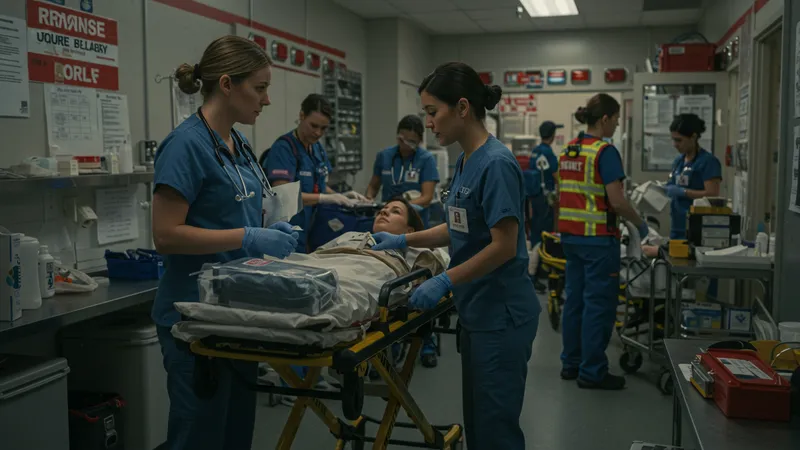
Training for disaster response is a crucial component of nursing education, involving simulations and scenario planning to build rapid response capabilities. Programs emphasize teamwork, leadership, and innovative problem-solving, preparing nurses to act decisively in high-stakes environments.
The effectiveness of nurses during disasters is evident in their ability to provide immediate care while managing logistical challenges. Their front-line experience contributes to ongoing improvements in global disaster response strategies, showcasing their role as key agents in emergency management.
With the increasing frequency of natural and man-made disasters, the demand for skilled nurses in disaster response continues to rise. Their contributions highlight the importance of readiness and the critical nature of interprofessional collaboration. As we push forward, explore inspiring accounts of bravery and innovation among nurses in the face of adversity.
Mentorship in nursing is invaluable, fostering skill development and career guidance. Experienced nurses serve as mentors, offering insights and support to those new to the profession. This relationship enriches both parties, fostering professional growth and strengthening the nursing community.

Effective mentorship leads to improved job satisfaction and retention, reducing burnout and enhancing patient care. Mentors provide not only technical guidance but also emotional support, helping new nurses navigate the complexities of their roles with greater confidence.
Structured mentorship programs are becoming more prevalent in healthcare institutions, recognizing the benefits of cultivating a supportive work environment. Nurses who engage in mentoring often report a renewed sense of purpose, contributing to a positive workplace culture.
The cultivation of future nursing talent through mentorship enriches the profession, ensuring the continuity of quality care and the perpetuation of core nursing values. Prepare to uncover impactful stories of mentorship and the indelible mark these relationships leave on careers and healthcare settings alike.
Nurses are increasingly stepping into advocacy roles, championing health policies that prioritize patient wellbeing and equitable access to care. Their unique experiences and insights enable them to influence legislative processes, driving improvements in healthcare systems globally.

Advocacy involves engaging with policymakers, crafting compelling narratives, and mobilizing community support. It requires nurses to act not only as caregivers but also as informed, proactive change agents, demanding continual professional and personal development.
In the era of digital communication, nurses leverage social media platforms and online communities to amplify their advocacy efforts. This digital engagement facilitates broader conversations and more immediate impact, reshaping perceptions and policies within healthcare.
As nurses embrace advocacy, their role in effecting systemic change becomes undeniable. This narrative explores bold initiatives and victories achieved through nursing advocacy, illustrating the power and potential of nurses as true champions for transformative health reform.
As we arrive at the culmination of our exploration, one thing is crystal clear: nursing is no longer confined to traditional boundaries. The dynamic field continually reinvents itself, staying abreast with technological advancements, innovative practices, and ever-evolving patient needs, shaping the fabric of healthcare globally. Whether you’re a seasoned nurse or just starting your journey, embracing these transformations equips you to thrive in a complex, rewarding profession.
Inspired to make a difference? Share this article with those considering a nursing career or explore more articles to deepen your understanding. Bookmark this page to stay updated with the latest trends transforming the world of nursing, and be part of the change that impacts lives every day. The future of nursing awaits your discovery—and contribution.